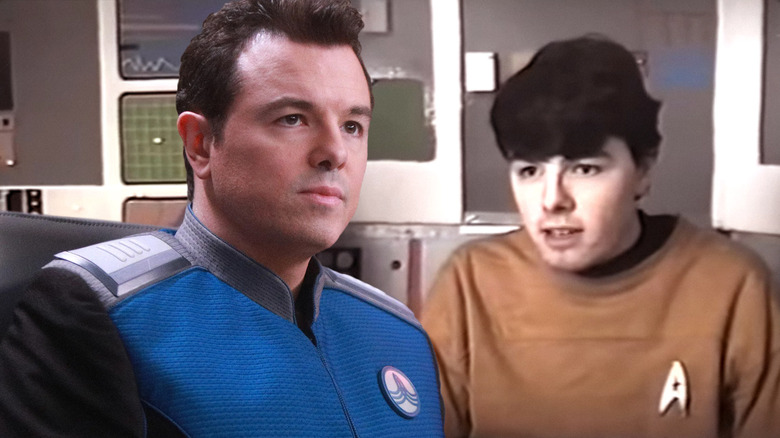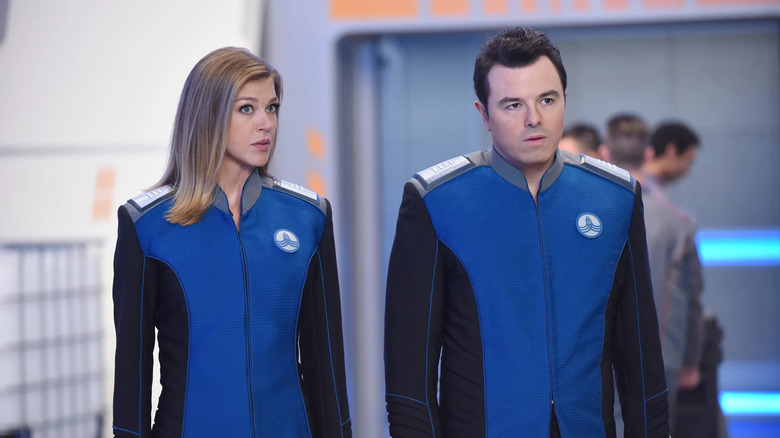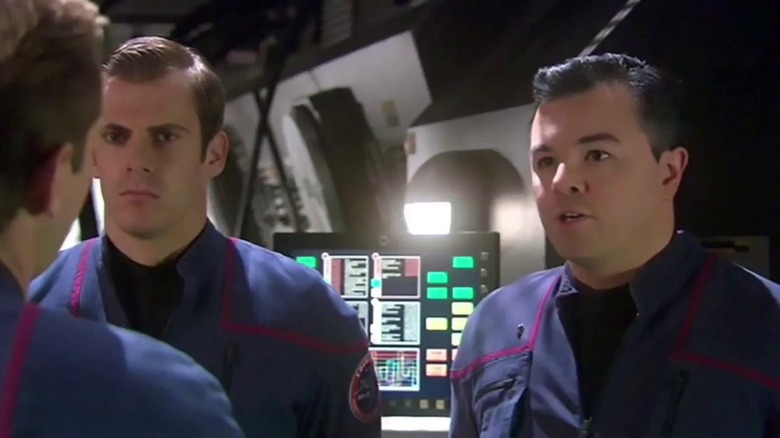Seth MacFarlane's TV Career Started With A Homemade Episode Of Star Trek
Anyone who has seen "The Orville" will intuit immediately that show creator Seth MacFarlane is a huge fan of "Star Trek: The Next Generation." In addition to the archetypal characters one might find in any post-"Star Trek" sci-fi show, MacFarlane borrowed a lot of "Star Trek" stories and key notions for his series. "The Orville" takes place in a future devoted to starship-driven space exploration, and starships tend to look a lot like the U.S.S. Enterprise, with various workstations lining the walls of a bridge overseen by a pair of commanding officers. Likewise, the Orville itself belongs to the Planetary Union, an organization similar to the Federation from "Star Trek." On top of all that, the crew of the Orville is a melting pot of various alien cultures, and its workers have to overcome their differences to solve problems and engage in diplomacy.
Perhaps to encourage further comparisons between "The Orville" and "Star Trek," MacFarlane cast Penny Johnson Gerald — a recurring actor from "Star Trek: Deep Space Nine" — as a regular on his show, with "Trek" veterans Jonathan Frakes, Brannon Braga, and Robert Duncan McNeill having served as directors
MacFarlane has also famously referred to the "Star Trek" franchise repeatedly on his animated shows "Family Guy" and "American Dad!," and he once hired William Shatner to reprise his role as Admiral Kirk for a live Academy Awards appearance. MacFarlane even showed up on an episode of "Star Trek: Enterprise." "Star Trek," it seems, is in his blood.
Appearing on "The Tonight Show Starring Jimmy Fallon," MacFarlane was playfully confronted by Fallon with a "Star Trek" fan film he had appeared in as a teen. It seems that he has been a Trekkie since his youth, and "The Orville" is merely an extension of his youthful passions.
I was a teenage Starfleet captain
MacFarlane was about 16 or 17 when he appeared in his fan film, a movie that resourceful internet dwellers should be able to find easily enough. The film uses Gustav Holst's "Mars, Bringer of War" as its score and it features MacFarlane as Captain Kirk barking orders to an off-screen Scotty about needing more power. MacFarlane does his best Shatner impersonation, which is, even as a teen, pretty good. The short also features some rudimentary blue-screen compositing that was pretty sophisticated SFX for amateurs working in the late 1980s. Spock is played by John Parley, who did not go on to a career in television. The actor who plays Uhura was only identified by MacFarlane as "Anouk."
The short follows the U.S.S. Enterprise through a space portal that deposits them "outside the space-time continuum." It's an earnest "Star Trek" homage, so don't expect a punchline or a comedy bit at the end. After watching the clip, MacFarlane congratulated Anouk and John for appearing on "The Tonight Show" (something they likely didn't know was going to happen).
MacFarlane was characteristically flippant when watching the short, stating that his only thoughts concerned his wig and the fact that he was so young:
"First of all, I don't know how they constructed whatever was on my head. But, yeah, what comes to mind is, like, I wish I had had the future knowledge of aging to say, 'Go down to the corner store, get a bag of Chips Ahoy!, and eat it all in one sitting, because it's the only time you're going to be able to do it.'"
MacFarlane turns 51 in 2024.
MacFarlane loves Star Trek
"Star Trek," thanks to its well-worn conceits and cultural ubiquity, is infinitely easy to lampoon. MacFarlane, who rose to fame with an ultra-snarky, fratboy-ready series like "Family Guy," could easily have pitched and made a satire of "Star Trek" that mocked the show's corny, peace-loving conceits or broad character types (Captain Kirk is often described as a reckless cowboy, even though he was actually quite judicious). But MacFarlane didn't want to satirize "Star Trek" because he loved it so much.
Indeed, MacFarlane has gone on the record with his affection. He told a story on one of the "Orville" DVDs about how he bonded with his father over a shared love of "Star Trek" and how "The Next Generation" came to be his favorite:
"My father had told me the story of being in a huge room when he was in college — when the original premiered — and all these college students standing in a room staring at this one TV to watch this strange new program that they're all understandably curious about. I'd heard my father talk about it in the past. I had seen bits and pieces but never really explored it. It very quickly became evident to me that this was something that was very, very special in terms of televised storytelling."
Like many Trekkies, MacFarlane was skeptical of "Next Generation" when it debuted. Also like many Trekkies, he eventually came around, embracing it as the best one. "I wasn't initially receptive to 'Star Trek: The Next Generation,' hilariously," he said, "because I now, you know, think it's the greatest of the series."
That he made "The Orville" was extremely fitting.


